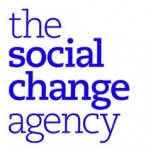

The Social Change Agency

City of London, United Kingdom
June 2016
Management consultant - nonprofits
Service with Minor Environmental Footprint
United Kingdom
The Social Change Agency delivers strategic consulting, providing the methods and tools to develop and deliver systemic change. They provide training and coaching, developing the knowledge, skills and confidence needed to make change happen and they facilitate cross-sector collaboration, bringing unusual partners together to create projects and events that make a real difference. They incubate new products that help create a systemic shift in the way people approach social change, like www.thecrowdfundingacademy.org and run events like www.houseparty.org The Social Change Agency knows that creating social impact is a complex process. They use systems thinking as the basis of their methodology, believing that if you want to address complexity, systemic change is a more powerful process for long term impact. When they work systemically, they map out the system, all of its component parts and all the seen and unseen aspects of it, even before they start to think about the next steps. They know that the smallest individual action can result in a big systems change and they understand how to achieve both. Everyone has a part to play in achieving this which is why they consider individuals as important parts of systems.
Overall B Impact Score
Governance 17.9
Governance evaluates a company's overall mission, engagement around its social/environmental impact, ethics, and transparency. This section also evaluates the ability of a company to protect their mission and formally consider stakeholders in decision making through their corporate structure (e.g. benefit corporation) or corporate governing documents.
What is this? A company with an Impact Business Model is intentionally designed to create a specific positive outcome for one of its stakeholders - such as workers, community, environment, or customers.
Workers 30.4
Workers evaluates a company’s contributions to its employees’ financial security, health & safety, wellness, career development, and engagement & satisfaction. In addition, this section recognizes business models designed to benefit workers, such as companies that are at least 40% owned by non-executive employees and those that have workforce development programs to support individuals with barriers to employment.
Community 16.7
Community evaluates a company’s engagement with and impact on the communities in which it operates, hires from, and sources from. Topics include diversity, equity & inclusion, economic impact, civic engagement, charitable giving, and supply chain management. In addition, this section recognizes business models that are designed to address specific community-oriented problems, such as poverty alleviation through fair trade sourcing or distribution via microenterprises, producer cooperative models, locally focused economic development, and formal charitable giving commitments.
Environment 3.0
Environment evaluates a company’s overall environmental management practices as well as its impact on the air, climate, water, land, and biodiversity. This includes the direct impact of a company’s operations and, when applicable its supply chain and distribution channels. This section also recognizes companies with environmentally innovative production processes and those that sell products or services that have a positive environmental impact. Some examples might include products and services that create renewable energy, reduce consumption or waste, conserve land or wildlife, provide less toxic alternatives to the market, or educate people about environmental problems.
Customers 15.1
Customers evaluates a company’s stewardship of its customers through the quality of its products and services, ethical marketing, data privacy and security, and feedback channels. In addition, this section recognizes products or services that are designed to address a particular social problem for or through its customers, such as health or educational products, arts & media products, serving underserved customers/clients, and services that improve the social impact of other businesses or organizations.
What is this? A company with an Impact Business Model is intentionally designed to create a specific positive outcome for one of its stakeholders - such as workers, community, environment, or customers.